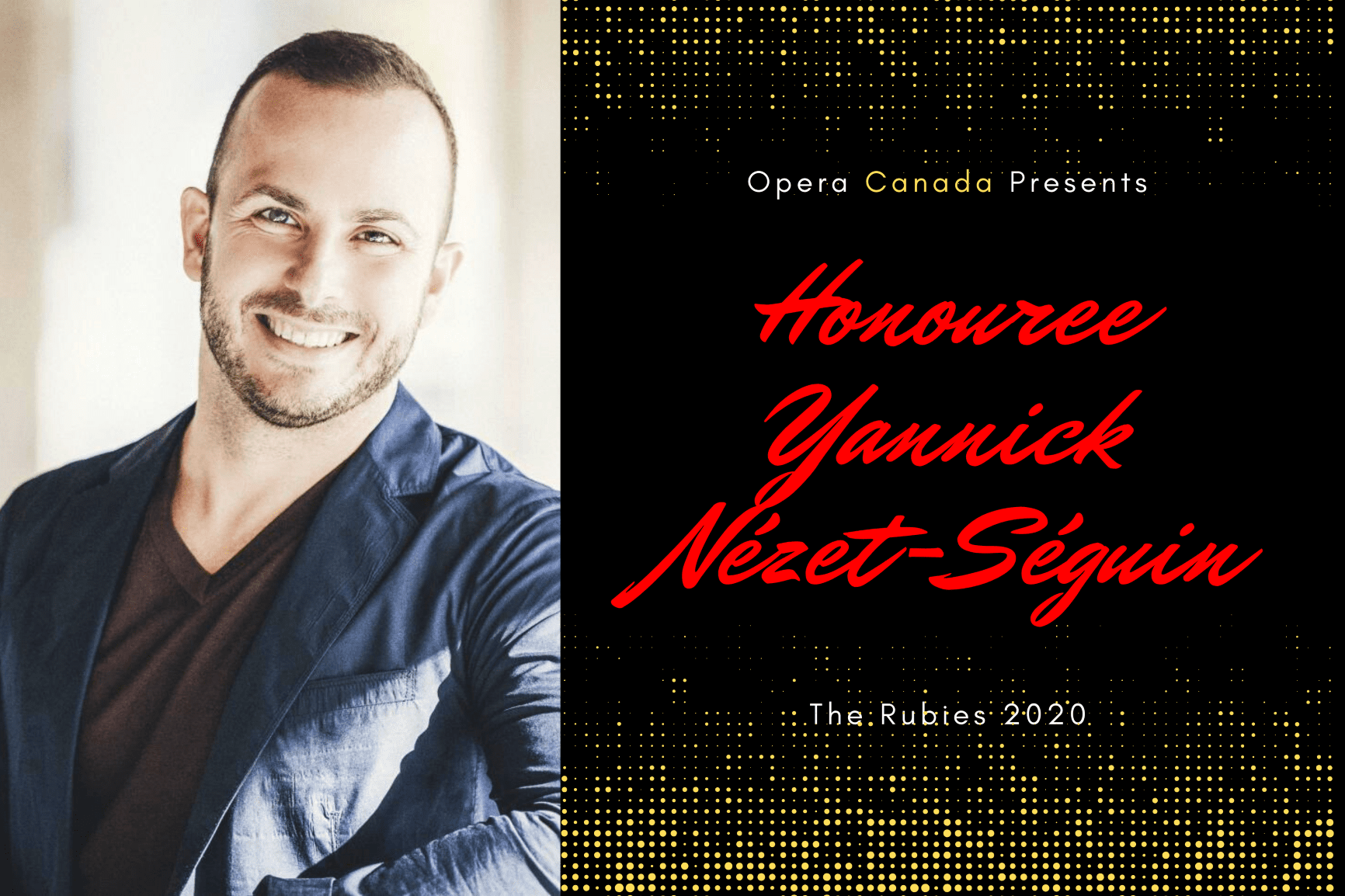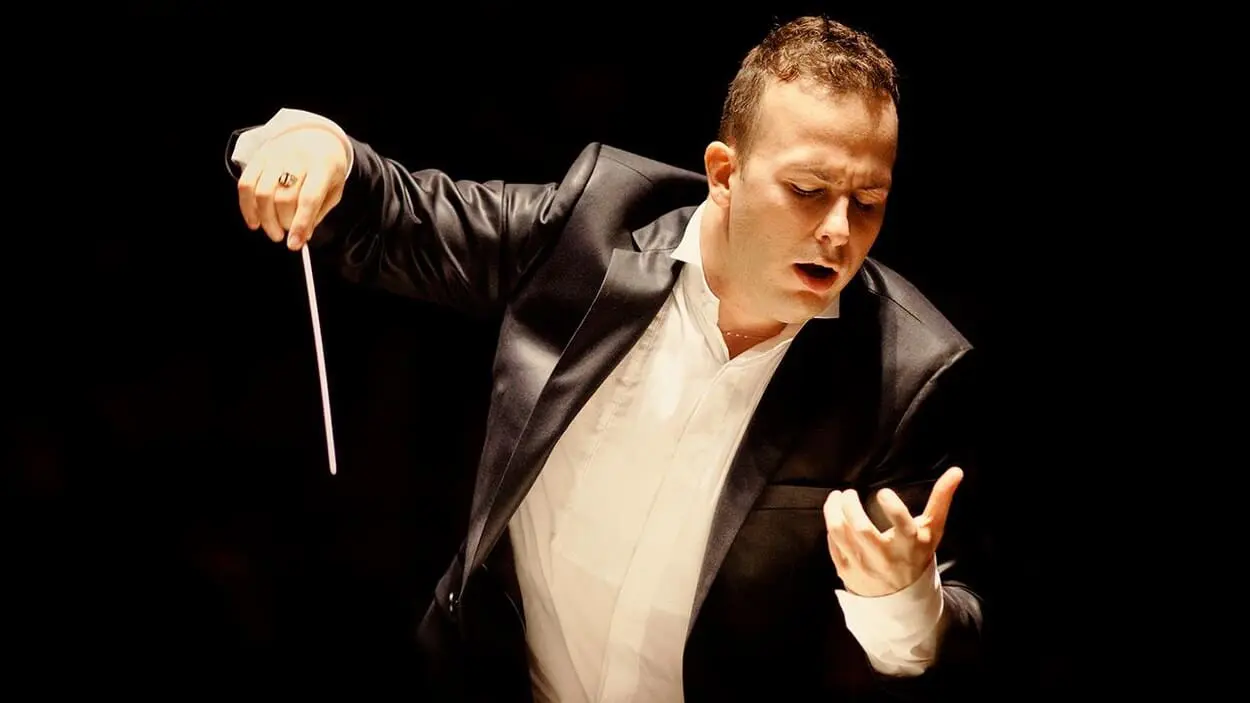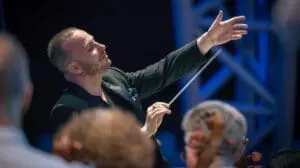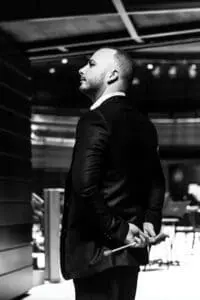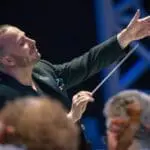2020 Rubies Honouree: Yannick Nézet-Séguin
Let’s begin with a bit of perspective. Back in 2003, when I first interviewed 2020 Rubies honouree Yannick Nézet-Séguin for an article in Opera Canada’s ‘Debut’ column, it was clear that at 27, he was already earmarked for a major international career. Born in 1975 to parents who were professors at l’Université du Québec à Montréal, Nézet-Séguin was an exceptionally gifted child, entering into the Conservatoire de musique de Québec at the age of 13, the youngest ever. He studied piano, composition, chamber music and conducting, winning five first prizes by the time he graduated in 1997. In 2000 and at the impossibly young age of 24, he conducted his first opera, Delibes’ Lakmé, at Opéra de Montréal, the same year that he became Artistic Director of Montréal’s Orchestre Métropolitain. At the time of our 2003 interview, he had just been appointed Chief Guest Conductor of the Victoria Symphony, and was looking forward to his European debut, with the Orchestre National du Capitole de Toulouse.
Fast forward to 2020. Now 17 years later at 45, the former wunderkind is on top of the conducting world, in demand everywhere. Nézet-Séguin divides his time as Music Director of the Metropolitan Opera, the Philadelphia Orchestra, and the Orchestre Métropolitain, as well as serving as honorary conductor of the Rotterdam Philharmonic and honorary member of the Chamber Orchestra of Europe. The list of accomplishments in his official website is astounding – six honorary doctorates, countless awards and accolades including the Companion of the Order of Canada, a prodigious discography, and 1,700 performances, as of May 2016. And now…an Opera Canada Award…a ‘Ruby’.
With live performances grounded to a halt due to the COVID-19 pandemic, it would seem to be a good time to snag the peripatetic Maestro for an interview. Sadly, no such luck – October turned out to be a super busy month for him, with a slew of virtual performances and other commitments. We made contact via email, with the Maestro supplying answers to my questions as audio files:
My heartfelt congratulations for the “Rubies” which you richly deserve. It’s a token of the appreciation to you from us Canadian opera lovers, for the great work you are doing. When I interviewed you for a 2003 “Debut” article in Opera Canada you were only 27, but already on the verge of a great career. Now 17 years later, you are on top of the conducting world! Tell us, what is the secret of your success?
Thanks, Joseph, for the congratulations. Ah, secret of my success…that’s very kind! But I believe I never envisioned my career as a ‘career.’ It has always been important in my life to enjoy making music, and to treat it with all my passion, seriousness and dedication. It’s true that I conduct internationally now, but I never really thought of it as a goal. I was so happy to be able to make music with Orchestre Métropolitain, and before that as an assistant at the Montreal Opera, and as the chorusmaster. I think it’s very important that when we make music – whether it’s Carnegie Hall or in the basement of a church – that one is not more or less important than the other. If you are always ‘in the moment’ doing what you do the right way and with all your heart, it leads to greater things, which was my case.
Looking at your website, I’m simply astounded at the number of performances you have already given, and at your huge discography. Would you say you are a workaholic? Do you have ‘down time’? What do you enjoy doing when you’re not making music?
I know I am very, very busy! I am busy during the pandemic for management reasons, trying to do my best for my institutions to get through this crisis. I am a busy conductor but I would never consider myself a workaholic, because I love what I do, and a lot of what I do is very ‘exposed’ – meaning that it’s in big institutions where people are aware of. Every musician I know is busy.
The members of the orchestras – Met, Philadelphia, Orchestre Métropolitain – they teach, they do chamber, they have their own ensemble…I believe they are all busy. I enjoy what I do. That’s what keeps me going. I do have some important down time. I take care of my body, which is very healthy for the mind. I do some training, workout, jogging, yoga, things that are very important and should be mandatory for every conductor and every musician.
I remember you mentioned in the 2003 interview that you admired [Italian conductor] Carlo Maria Giulini when you were starting out, and you also mentioned Colin Davis and Bernard Haitink. What qualities in their conducting inspired you? Any other conductors, past or present, you admire and respect?
Of course, Giulini remains my great mentor. He allowed me to observe him, to have meetings with him, when I started conducting. So Giulini is still the absolute model. But I also admire Bernard Haitink, like I mentioned to you at the time, and Colin Davis as well. And I love what Toscanini does, and what Furtwängler does, and what Karl Böhm does. I admire a lot of the new [conducting] voices in opera. I admire very much what Gustavo Dudamel does, and what Mirga Gražinytė-Tyla does. I love Susanna Mälkki, and I love Nathalie Stutzmann, who successfully went from singer to conductor. These are voices that are really great to have in the world at the moment.
Your training was almost entirely in Canada. Can you say a few words about your Canadian training?
Yes, I am proudly trained in Canada, mostly at the Conservatoire du musique de Montréal. I think the conservatoire system is fantastic. It mirrors the European system, but making it relevant to North America. I think we have great training in Canada, and I really believe in it and very proud of being an alumni. The quality of the teaching, also the fact that maybe it’s not such big classes, it encourages more individuality and creativity. I think it’s something we need to cherish. I love to see that people who have been in the international scene are now starting to teach, it’s very reassuring for the future.
You divide your time between opera and symphonic conducting. And you have the reputation of being a ‘singers’ conductor.” Anyone whom I’ve spoken with or read about – they love you! What is your secret to working so well with singers?
Well, I love that the singers love to sing with me, but I believe that as a conductor, one needs to be at the service of the singing, the human voice. Even in symphonic [repertoire], we as conductors need to remember to breathe, to accompany, and to listen – these values are not talked about enough in the teaching of conducting. We need to listen as much as to guide. That’s the true recipe to get great results in a collective art form.
Is working with singers very different from working with orchestra musicians? What is your philosophy of conducting? Do you work by consensus? Or do you ‘rule with an iron baton’? – just joking!
It shouldn’t be so different between singers and orchestra musicians – it’s all about listening, giving, being in the moment, rehearse carefully so that we can set everyone free. The conductor needs to be clear, in order to give everyone confidence so they can express the music.
I think sometimes there’s a misunderstanding about the clear beating pattern, or to let singers do without beating too much. There is a way of being clear and let the people express and be free. It’s all a question of balance. It’s never a consensus though – the conductor needs to have a clear vision of the big picture. But that big picture and clear vision need to take into account the input of every artist – singer or instrumentalist. When that works, this is where we can get great results.
In our 2003 interview, I asked you about your ‘dream operas.’ You mentioned Don Carlo, Salome, Der Rosenkavalier, and Parsifal. Have you conducted these operas? You told me “I will become a Wagner addict.” Have you become a Wagner addict? Well, I am a Wagner addict and I would LOVE to hear your Parsifal!
Well, it’s interesting that I mentioned these operas in 2003! I did conduct Don Carlo three times – twice at the Met, once in Amsterdam. I conducted Salome twice, in Montreal and in Philadelphia. Parsifal I conducted twice, at Lanaudière and the Met. I never conducted Rosenkavalier so far – it’s still on my dream list! I am planning to conduct more Wagner, doing a Ring Cycle in Rotterdam, slowly, in concert first, eventually of course a fully staged Ring, at the Met.
The music world is going through a tough time right now because of the pandemic. How do you manage to stay focused in your work? What advice would you give to the many musicians who are struggling to survive right now?
Of course, the opera world is hit very hard by this pandemic…the entire cultural world is! The biggest struggle is to get through this, you know. It’s the people out of work, people studying without immediate goal, how to sustain livelihood. It’s great that we have in Canada a social security which is better than other countries. We should be proud of this. But it doesn’t change the fact that in many places, culture is not valued as an essential service. It should be. Opera, like ballet, specifically is much more difficult. Because in opera, interaction is key, so many people are involved, not only the artists on stage but all the craftsmanship…the set design, the lighting, the costumes – that’s complicated. We absolutely should make sure that we don’t lose any player in the game during this long ‘intermission,’ so that when we resume, it’s going to be an even better world, with more imagination, hopefully more diverse, more representative, more equal and more relevant. Opera should reflect society, and I think we are learning a lot about this during the pandemic. If we can get through this – and I am sure we can with our creativity (and especially in Canada), we are going to have great days when it is all over.
Recently I saw a video of a masterclass you gave – do you enjoy teaching? What qualities do you look for in a student? Either a singer or a conductor?
Yes, I am doing a lot of masterclasses. During the pandemic I have Zoom talks, working remotely with the Lindemann Young Artists program at the Met, listening to them via Zoom. It’s far from ideal, but it keeps me in touch with the young musicians who are in need at the moment of guidance. Yes, I do enjoy teaching and mentoring. I can’t really teach on a regular basis like every week – it doesn’t fit with my schedule at the moment, but I have been mentoring for many years now two conducting fellows each year at Curtis Institute in Philadelphia. I am working with young singers at the Met and at Juilliard, and at the opera studio at Curtis. I work whenever I can, giving masterclasses at McGill University, and giving masterclasses to the Atelier lyrique de l’Opéra de Montréal. This is very important to me, to transmit my experience, my passion for the art form. Qualities I look for? Of course a great willingness to be prepared, and to be disciplined. Curiosity is super important – not just about what we sing or play, but more general about the art form, and the world. This will be reflected in the way we sing or play or conduct. I look for that special personality, that passion, that will lead you to make all the sacrifices possible in order to achieve your goal.
What is the best piece of advice you have been given, an advice that has helped you to be the artist and the person that you are today?
“Be yourself, be curious, believe in what you do” – that’s something that Giulini was very helpful in guiding me. Not to imitate anyone, not trying to get all prepared answers to questions. I think we find answers for ourselves, the answers that reflect who we are, they are our own individual voice. And that’s what matters, to be our own self, because we are unlike any other…

